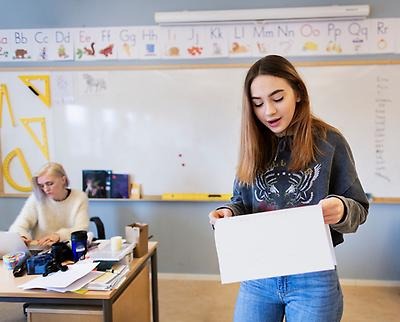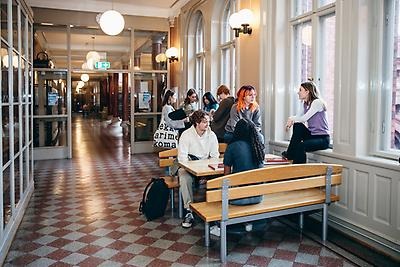Education
In Sweden, school is compulsory from kindergarten up to and including secondary school. Education is free of charge In Sweden, and a lunch meal is included every day. You may need to attend a so-called “preparatory class” before you start school together with Swedish pupils. Your teachers and school staff will be there to guide and support you.

Photo: Scandinav/imagebank.sweden.se
Education in Sweden
Going to school is an important part of growing up in Sweden. Once you have moved to Sweden, you will start going to school there, too.
The Swedish compulsory school system has different levels: kindergarten, primary school, secondary school, and upper secondary school. When you’re six years old, you start kindergarten, and the year you turn sixteen, you finish ninth grade. That marks the end of your compulsory education. After that, you can start upper secondary school, which lasts three years.
Upper secondary school is not mandatory, but it is good for you to go to upper secondary school because it makes it easier for you to get a job. You must also attend upper secondary school if you want to continue your studies at a college or university.
In Sweden, education is free for everyone. Boys and girls attend school together. The school day includes a free meal, which you get during your daily lunch break. In Sweden, there are no school uniforms. You can decide for yourself what you want to wear to school.
Going to school in Sweden
When you come to Sweden, you will get a place at a school. There, the teachers will first find out what knowledge you have from before, so that you end up in the right class. Then they will make a plan for what you are going to learn. It is common for children who are new to Sweden to attend a so-called “preparatory class” first. In the preparatory class you will get an introduction to the Swedish language and learn about Swedish culture.
Going to school is important for children and young people in Sweden. In school you will learn mathematics, science, social studies, geography, sports and music. All pupils have Swedish and English lessons.

Photo: Lieselotte van der Meijs/imagebank.sweden.se
You will go to school five days a week and usually also have homework to do after school. A normal day at school starts around 08:00 in the morning and ends in the afternoon. In addition to your time in the classroom and learning about different things, you will have a lunch break and breaks between classes during which you will get to know your classmates.
In school, it is important that pupils show respect for their teachers, and also that teachers show respect for the pupils. You can use your teachers’ first names when speaking to them. It is common for pupils to talk openly with their teachers about many different topics.
In Sweden, children’s education is not only the responsibility of the school. Parents and legal guardians also play an important role. The teachers have regular meetings with pupils and legal guardians to talk about how things are going in school and how the pupil can get the help they need.
Teachers may also talk to a pupil and their legal guardian if the pupil does not follow the rules at school. No teacher in school is ever allowed to use violence against a pupil. When a pupil breaks the school’s rules, there are other ways to resolve the issue.
You can get support during your studies
The well-being of young people is important. That is why Swedish schools have special staff who can guide and help you during your schooling. For example, there are counsellors and school nurses to talk to if you have problems or questions about your studies, friends or family. They are not allowed to talk to anyone else about what you have told them. This means that you can talk to the counsellor or school nurse about things that you do not dare or want to talk about with your family or friends.
In addition to helping you with your mental and physical well-being, schools also have a student counsellor. The student counsellor can help you figure out what you want to do after you finish school. They can also help you apply to a higher education programme and tell you about various jobs and career paths.
Higher education
After completing primary and secondary school, it is recommended that you continue your studies at an upper secondary school. There are many different upper secondary school programmes with different subject specialisations. This gives you the opportunity to study something that you really enjoy.
Questions to think about and discuss:
- How do schools work in your country of origin? What differences or similarities do you think there are compared to Sweden?
- Do you have a plan for what you want to study or work with in the future?